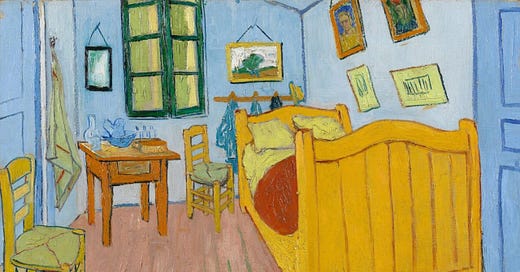Hello friends,
Hope you’re doing fantastic!
This week I’m experimenting (again) with the format of the newsletter. Nothing too crazy, though. This time I’m doing three sections: in the first two I briefly cover two topics/idea that are top of mind, and then in the last one I curate a handful of gems I found during the week.
If you have any feedback or suggestion, please shoot me a DM on Twitter. Would love to hear your thoughts.
Now, let’s dive right into it!
Fighting against distractions
In 1949, English writer George Orwell published his classic, dystopian novel 1984. With this book, Orwell tries to illustrate how the world might have looked like if a totalitarian, oppressive government like the Soviet Union had taken over.
The citizens of this fictional world are deprived of even the most basic and fundamental freedom - being themselves and choosing their own thoughts. They're always being surveilled, information is highly censored and all they get is propaganda.
Today, most of us are lucky to live in places where this is far from being the case. However, that doesn't rule out the possibility that we might be living in a somewhat dystopian society as well.
In 1932, almost 20 years before Orwell's book, Aldous Huxley published his novel Brave New World. Contrary to Orwell, Huxley imagined a future characterized by technological progress, massive access to information and freedom. But Huxley's seemingly perfect world is also a dystopia. One we might be living in:
What Orwell feared were those who would ban books. What Huxley feared was that there would be no reason to ban a book, for there would be no one who wanted to read one. Orwell feared those who would deprive us of information. Huxley feared those who would give us so much that we would be reduced to passivity and egoism. Orwell feared that the truth would be concealed from us. Huxley feared the truth would be drowned in a sea of irrelevance. Orwell feared we would become a captive culture. Huxley feared we would become a trivial culture.
The text above is the foreword of Amusing Ourselves to Death, a book I’m planning to read in the next few weeks as I go on an information diet and start a massive digital cleanup.
In a past issue, I explained the concept of mindful content consumption. Now, with this experiment, my aim is to apply those principles to all my inputs and see how it affects my mental well-being and my creative work.
Fighting distractions is not a matter of willpower or discipline anymore. You’re fighting against products that were deliberately engineered and designed to exploit the vulnerabilities of your mind. So in order to win to win this fight, you’ll need frameworks, systems, strategies. That’s what I’ll be trying to solve for.
Don't be a starving artist

Be regular and orderly in your life, so that you may be violent and original in your work.
If you ask anybody how you can be more creative, probably no one would advice you to get your money right. What the hell does creativity have to do with personal finance anyway?
Maybe more than you think.
Financial struggles can be the cause of severe distress, which in turn affects your well-being, your relationships and, of course, your creativity. How do you expect to be focused and have the mental energy needed to produce your best work if you're constantly worrying about money?
Poet Charles Bukowski was right — you don't need lots of air and light and time and space to create. If you really feel the urge to say or make something, you'll find a way to do it despite all hardships and obstacles. But once you hone your skills and build a creative habit, you'll need to take creative risks to produce your most innovative work. And it's extremely hard to take those risks when you lack the stillness and safety provided by financial stability.
To be clear, by financial stability I don't necessarily mean being a millionaire (Although that could help). I mean being debt-free, having an emergency fund, having several streams of income, living below your means, etc.
Financial stability gives you room and freedom to take bold, creative leaps. If you want to spend most of your time, energy and attention creating, you would definitely benefit from it.
Weekly gems
These are some of the most interesting things I found this week:
Paul Graham's essay Early Work: In this essay, Graham shares his insights on how to better judge and evaluate new ideas or projects so we don't give up on them too early. My favorite highlight: The right way to deal with new ideas is to treat them as a challenge to your imagination — not just to have lower standards, but to switch polarity entirely, from listing the reasons an idea won't work to trying to think of ways it could.
Patrick Gunkel, the eccentric and insanely curious genius who created Ideonomy, "the science of the laws of ideas and of the application of such laws to the generation of all possible ideas in connection with any subject, idea or thing." If you’re having trouble to come up with an interesting, new idea, I highly recommend checking him out.
One of Richard Feynman's sketchbooks filled with, of course, equations but also some cool drawings.
Indie Hackers podcast episode with Daniel Vassallo. Daniel's story is full of insights and useful lessons for all aspiring full-time creators. My main take-aways: create a small portfolio of bets and focus on the 80/20 rule.
If you liked this edition of Rational Creatives, why not share it with a friend?
If somebody forwarded this to you and you liked it, why not subscribe?
Scientists have shown that by sharing or subscribing to Rational Creatives, you automatically become 35% more rational and 45% more creative. Are you gonna miss out on that?



